- Home
- Jane Peart
Undaunted Spirit Page 7
Undaunted Spirit Read online
Page 7
Surprised at this courtesy, the kind she had not encountered often on her long, arduous journey and certainly had not expected in this rugged frontier town, Mindy murmured her thanks and proceeded him into the hotel.
The lobby was not any more palace-like than the exterior. Any port in a storm, Mindy thought as she glanced quickly around her. At the registry counter a balding clerk regarded her with curiosity. “I’d like a room, please.”
“One night or two?”
She hesitated. If the reporter’s job were already filled? What then? There would not be another train east until the next day. She had already wisely checked with the conductor. “Two.”
He took a rusty key from the board behind him and handed it to her. A tattered cardboard tag attached to it bore the number “7.” “Up them steps, first room on the left,” he pointed to a wide, rather crooked staircase.
“Could you please tell me where the Roaring River Gazette is located?”
Before the clerk answered, a voice behind her spoke. “It’s just down the street at the corner, to your left as you come out the hotel.”
Mindy turned to see it belonged to the same gentleman who had opened the hotel door for her.
“Thank you,” she said, wondering who he was. He certainly did not look, dress, or behave like the other residents she had observed on her way from the train station. Did he even lived in Coarse Gold? But then, how else could he have known where the newspaper office was? Of course, it wouldn’t do to ask.
As if reading her mind, he replied, “I’ve just come from the Gazette. My uncle is the editor.”
What a coincidence! Mindy would have dearly loved to find out more about the man she was about to ask for a job, query his nephew about her chances, and discover if there was any prejudice against hiring a woman. But again, she didn’t dare. It would have been unseemly. It might give this stranger the right to take liberties that would have been improper. Although he had the manners of a gentleman, a woman alone could not be too careful of giving the wrong impression. So Mindy merely nodded, took her key, picked up her valise, and climbed the uneven stairs to her room.
She shouldn’t have expected much from the room, considering the general condition of the hotel. Still, she felt dismayed as she entered and glanced around. It contained a bed, a washstand, and a rickety chair. This was as bad as the attic room inhabited by the Irish maids she had described in her Dixie Dillon column. Dust was everywhere, a fine powdery beige on everything. Mindy did not dare try out the bed. She would face that later. First, she must present herself to Byron Karr, the editor of the Roaring River Gazette.
She washed off as much of the grime from the train trip as possible in the lukewarm water, poured from a pitcher into the small bowl. All Mindy could think was, What would mother’s aunties say to this? Since, their standard was “Cleanliness is next to godliness,” they would be scandalized for sure. Before she left Woodhaven, she had been the recipient of all sorts of cautionary advice, dire warnings, and heartfelt pleas to change her mind—all from a wide contingent of her mother’s relatives. All fell on deaf ears. Mindy was determined not to turn back. Whatever her own reservations about her rash decision—made in the grip of disappointment, disillusionment, and loneliness—she honestly felt her destiny lay elsewhere. Somewhere far from Woodhaven her dream awaited.
She had sold many of the treasured belongings left in the McClaren house to pad out her traveling expenses, insuring that she would have enough money in case she met with any emergencies—or, heaven forbid, when she arrived in Colorado and did not get the job. It was a possibility she wouldn’t consider and one she certainly did not share with her worried relatives.
The day she left, Mindy’s chest had felt like a heavy stone. Her sadness at leaving these loving people, who had known her since she was born, had been too deep for tears. For their sakes, she had tried to act sure of herself and composed, afraid that she might show her own fear that, as many of them said, she was making a mistake. At the station she had gone from one to the other, hugged and kissed them, and was showered with farewell gifts. Baskets of fruit, fried chicken, and hard-boiled eggs had been thrust upon her as though she would starve on the trip otherwise.
Mindy had pressed her face against the train window to keep the picture of the little group, waving damp handkerchiefs at the end of the station platform, in her view as long as possible.
Actually, the food had come in handy. On the harrowing trip across the prairie, the train made only short stops, during which the passengers could stretch their legs and rush to get something to eat. Makeshift restaurants—actually weather-beaten shacks—provided tough, greasy meat, hard bread, and warm beer to the desperate travelers. As a result, Mindy was sure she had lost weight in the days she had been on the train.
Now she had arrived. She had survived the trip. Someday, she decided, she might even write about both the frightening moments and the hilarious incidents that she had experienced. But right now, her next step was to present herself at the newspaper office.
Outside, on the hotel porch, several roughly dressed men, miners perhaps, lounged in chairs tilted on the back legs leaned against the wall. They all jolted upright as Mindy stepped out the door. A few stood up, touching the brims of battered felt hats. Mindy inclined her head in acknowledgment of the politeness. As she stood at the top of the steps for a minute, one grizzly bearded man spoke. “The Gazette’s jest down the street to your right, ma’am, can’t miss it.”
Another one jerked his thumb left, “Jest ’crost the road from the general store and Doc Mason’s office.”
Mindy had all she could do not to laugh out loud. Already her purpose for being here had made the rounds, probably from the hotel clerk. The man who had identified himself as the editor’s nephew, she suspected, was too much of a gentleman to have spread the news. Nodding her thanks, Mindy went down the steps, turned left, and walked down the board sidewalk.
She soon found herself in front of a grayed frame building on which was posted a slightly askew sign identifying it as THE ROARING RIVER GAZETTE.
Her heart thumped wildly as she turned the doorknob. She walked into a dimly lit, cluttered room. At one end, a man sat at a roll-top desk stacked high with papers. Mindy stood there for a full minute before he seemed to be aware that someone had entered. He half-turned, his spindle-back chair squeaking noisily as it swiveled.
“Mr. Karr?” she said, trying not to sound tentative.
“The same,” he replied in a husky voice.
She picked her way through the obstacle course of the room to his desk. As she got close, she could see he had tousled brownish hair and at least a two-day stubble of a beard on his deeply lined face. He was without a jacket, wearing suspenders over a rumpled shirt with the sleeves rolled up. He looked at Mindy with bloodshot eyes and in a slightly slurred voice asked, “Well, what can I do for you, young lady?”
Mindy’s heart sank. Had he been drinking?
“I’ve come about the reporter’s job.”
His bushy eyebrows rose alarmingly. He straightened up from his slumped position and gave her a long, evaluating look. “The position’s already been filled. In fact, I was just sending out the acceptance letter to someone called—” He glanced down at the paper on his desk, adjusted his glasses, which had slipped down on his nose, and read, “Howard McClaren.”
Relief swept over Mindy. “That is I. I’m Howard McClaren,” she said. Then smiled, “That’s me. No, I mean I.” The editor stared at her. “You?”
His glance moved over her small, slender build, her shining blue, long-lashed eyes, her eager smile.
“Yes, sir, I am Howard McClaren. I wrote to you nearly a month ago and not having heard back, I assumed that the best thing to do was to come in person.”
The editor shuffled through a pile of papers in his wire basket and brought out the letter Mindy recognized as hers. The one in which she had stated her qualifications for a reporter’s job and given her credits, inc
luding some tear sheets of her two Dixie Dillon columns. He tapped the letter with bent knuckles and demanded, “And all this background experience in newspaper work is true?”
“Yes, sir.”
Karr was still holding the letter, his eyebrows drew together in a fierce frown. “What’s the ‘I’ stand for?” he growled. Mindy raised her chin defensively. “Independence.”
The editor’s mouth twitched in a futile effort not to smile. He stroked his chin, “And are you? Independent?” “I try to be. In the best sense of that word. I try to be responsible, punctual, and meet my deadlines.”
“Well, I guess you are—comin’ all this way on a chance that the job was still open and that I might even hire you. How’d you know I don’t think a newspaper’s no place for a woman?” he looked at her sharply. “I reckon you must have some gambler in you to do that.” He paused, picked up her letter and studied it for a long minute. Then a grin cracked his seamed face. He squinted up at her. “Well, I guess that’s good enough for me, Independence Howard McClaren. I guess you’ll do. When can you start?”
Chapter 11
Tomorrow,” Mindy gasped.
“Fine. Be here at eight.” Karr reached for his coat jacket on the back of his chair. “I’d show you around the place, but my nephew’s leaving for San Francisco this afternoon, and I’ve got to see him off.”
“I understand. Tomorrow will be just fine.”
“Tomorrow will be time enough. Friday’s pretty slow. We put the paper to bed yesterday, and Pete’s gone fishin’, I expect, and who knows what that rascal Timmy is up to. You’ll meet ’em and get to know ’em soon enough.”
Karr stood up, picked up his jacket and started toward the door. Then, as an afterthought, turned back and said, “You got a place to stay?”
“I took a room at the Palace Hotel.”
Karr made a face. “That’s no place for a lady. Go to Mrs. Busby’s boarding house. Clean rooms, good food, safe. A lot of miners come in from the hills on weekends and go to the Palace. The place can get rowdy, and the music goes on until the wee hours. Those fellows carouse all night. It’s not unusual to see a couple of brawls and people thrown out into the street.” The editor shook his head. “As I said, no place for a lady.” Karr shrugged into his jacket. “Come on. I’ll take you over and get you settled. Got luggage?”
“Yes, I left my trunk at the station. I thought I’d leave it there until I was sure—”
“Well, you’re sure now.”
“Yes, thank you. I can’t tell you—”
“Don’t bother. You’ve still got to prove yourself.”
“I know, I just—”
Karr pulled out his pocket watch. “Good grief, that train’s due to leave in fifteen minutes. Can you wait until it goes? I’m supposed to meet my nephew there.”
“Please go ahead. You don’t want to miss seeing your nephew off. I have to go back to the hotel, pick up my baggage check.”
“Good enough,” he grinned. “Your name suits you, Miss Independence.”
Mindy hurried back to the hotel, up to her room, retrieved her claim ticket, repacked her valise. The desk clerk eyed her suspiciously when she checked out.
“You still have to pay for the half-day you used the room,” he grumbled.
“Of course.” She handed over the money and then, with as much dignity as she could manage, walked out with her head high.
She got to the station just as the train was ready for departure. She spotted Karr and his nephew, whom she had already met at the Palace Hotel, standing on the platform. Karr introduced them, but the shriek of the train whistle drowned out his voice so Mindy did not catch his nephew’s name. He smiled pleasantly, however, and said, “Pleased to meet you, Miss McClaren.”
A few minutes later, amidst the swirling steam just as the train was beginning to move, he swung up the train steps, waving his arm, and then disappeared into the car. Mindy stood there with Karr until the train rounded the bend.
“Come on, now. I’ll get someone to tote your trunk, and I’ll take you over to Mrs. Busby’s.”
Mrs. Busby turned out to be a motherly soul who gave Mindy a long, evaluating look at first, and then gladly took her under her proverbial wing. She gave Mindy a room on the second floor at the back of the house and told her briskly, “You’ll want a nice quiet place to come after a day at Mr. Karr’s newspaper. You can get your breakfast and supper here, but for the midday meal you’re on your own.” She winked at Mindy and, lowering her rather strident voice, added, “I takes my nap then. Need it. Up at four and in the kitchen cooking; then supper preparation begins at four in the afternoon.”
Mindy spent the rest of the day getting settled in. It had all worked out much better than she could have imagined. Her impulsiveness in coming to Coarse Gold had paid off. Of course, she didn’t know what she would have done if Byron Karr had not hired her.
Mindy did have a few bad moments, however, as she unpacked her trunk and came upon the mementos she had brought with her. They didn’t amount to much, because most of the furnishings, bric-a-brac, and other family belongings had been shipped to her mother in North Carolina. The rest of the family possessions, at least those that Tom and Emily had not taken to their new home, had been sold with the old house. Still, handling the few small things she had chosen to keep brought unexpected tears.
There was the little porcelain clock from her bedroom, the brush and comb set her parents had given her for her sixteenth birthday, the book of Farell’s poetry he had hand lettered and bound for her. Farell, her dearest friend and confidant, how she missed him and would go on missing him for the rest of her life. But she knew he was happy where he was and she had to go on her own path. Perhaps, some day, when she was a famous journalist . . . Mindy smiled at her own foolishness. Sighing, she put her special belongings in her new room and was immediately filled with excitement. What an adventure this would be, and she meant to savor every minute of it.
That evening when the a cow bell clanged loudly at six, Mindy went downstairs to the dining room. Mindy felt a dozen pair of eyes turn on her. There were two long tables and on each side sat a row of men. She was taken aback. Were all Mrs. Busby’s boarders men? Probably. Not many single women came west alone to take a job usually occupied by a man.
Mrs. Busby, red-faced from the kitchen heat, came bustling in with a tray containing huge platters of chops and bowls piled with mashed potatoes and beans. After setting them down on the table, she announced in her loud voice, “Now take a good look, gentlemen. This young lady is a new employee of the Gazette, and Mr. Karr don’t want her gettin’ no hasslin’ from nobody. She’s a special lady, and we want her to be comfortable and happy. And I won’t take none of your pranks nor silly doin’s, you hear me?”
There was a murmur from both tables. Mrs. Busby waited, hands on hips, for her words to sink in. Mindy felt her cheeks flame under the scrutiny before everyone lowered their eyes. Then Mrs. Busby ordered, “All right now, plow in.” The men immediately began passing bowls and piling their plates full.
Mrs. Busby came over to where Mindy stood at the doorway, uncertain of where she should sit. Her quandary was soon resolved when Mrs. Busby said, “Mr. Karr’s coming over to eat with you tonight. He thought it might be easier for you this first time, and he had some things about the paper to discuss with you.”
Gratefully, Mindy followed her to one of the smaller tables that ringed the dining room. It was set for two. She didn’t have long to wait until Byron, his hair slicked down wearing a freshly laundered shirt, arrived.
Right away, Mindy discovered Byron Karr was an educated man who knew the newspaper business. How he had ever ended up here in this isolated Colorado town was a mystery. Their conversation went well. Byron sketched some of his hopes for the expansion of the paper to a biweekly as the town grew.
“Of course, that pretty much depends on how long the silver holds out. Some of the mines have been emptied. There may be others with rich veins no
one has yet discovered. Even if the silver goes, this town has other possibilities, in my opinion. Pure air, good healthy climate, room for people with ambition and goals. The west still has a long way to go, but back east people are getting the idea that here is where a man can make his own way—or a woman, for that matter.”
As Byron talked, Mindy felt an anticipatory thrill. She knew that this was a chance of a lifetime. To work with someone who knew the newspaper business from the inside out.
Chapter 12
From that first day at the Gazette, Mindy’s days were filled with a variety of jobs Byron assigned to her. She met Pete, the printer, a man of indiscriminate age, round shouldered, keen eyed, with gnarled hands and ink-stained fingernails. With a stub of a pipe clenched in his mouth, his permanently wrinkled brow gave his face a quizzical expression. When Byron brought Mindy back to the composing room, Pete gave her a curt nod and a cautious look.
Next to be introduced was Timmy, the snub-nosed, fourteen- year old “printer’s devil.” He was learning the trade and doing everything around the newspaper office that needed doing: sweeping, emptying the trash, running errands, and the folding of the paper on publication day, a job for which Mindy was also recruited. While they worked together, she learned Timmy was an orphan. He lived in a back room of one of the saloons—a kindness shown him by the bar owner. Timmy was extraordinarily bright and perennially cheerful—which was a nice contrast because Pete was often grumpy and Byron . . . well, Byron was sometimes “not himself.” At least, that was the most tactful way Mindy could express it. By the time she had been in Coarse Gold a month, she had learned that Thursday, after the paper had been printed, Byron usually went on a serious drinking binge. Most of the time, he crossed the street and disappeared into the Golden Slipper. Occasionally, it was the Friendly Spur. Other times he simply disappeared.

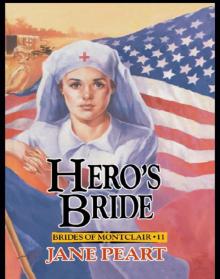 Hero's Bride
Hero's Bride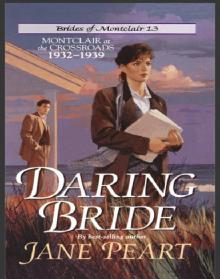 Daring Bride
Daring Bride Runaway Heart
Runaway Heart Promise of the Valley
Promise of the Valley Gallant Bride
Gallant Bride The Pledge, Value
The Pledge, Value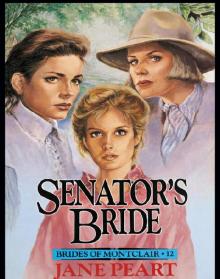 Senator's Bride
Senator's Bride Valiant Bride
Valiant Bride Shadow Bride
Shadow Bride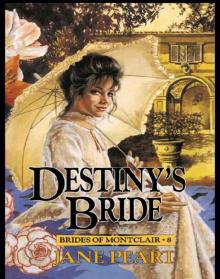 Destiny's Bride
Destiny's Bride A Tangled Web
A Tangled Web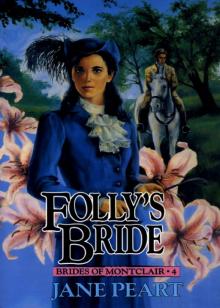 Folly's Bride
Folly's Bride The Promise
The Promise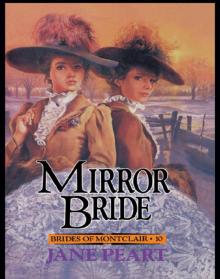 Mirror Bride
Mirror Bride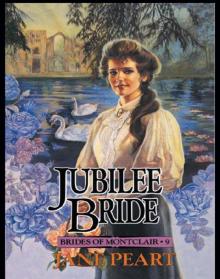 Jubilee Bride
Jubilee Bride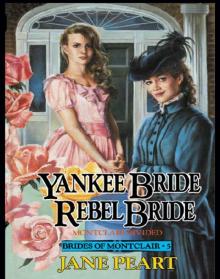 Yankee Bride / Rebel Bride
Yankee Bride / Rebel Bride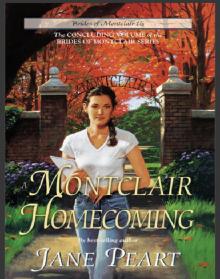 A Montclair Homecoming
A Montclair Homecoming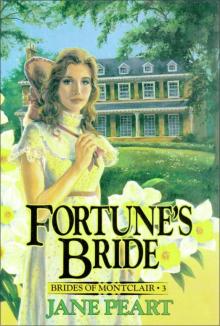 Fortune's Bride
Fortune's Bride Undaunted Spirit
Undaunted Spirit Love Takes Flight
Love Takes Flight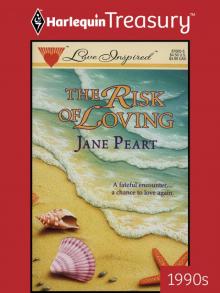 The Risk of Loving
The Risk of Loving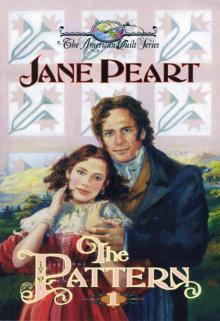 The Pattern
The Pattern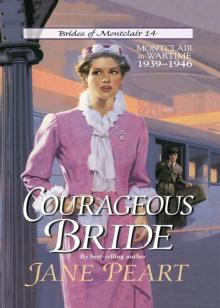 Courageous Bride
Courageous Bride